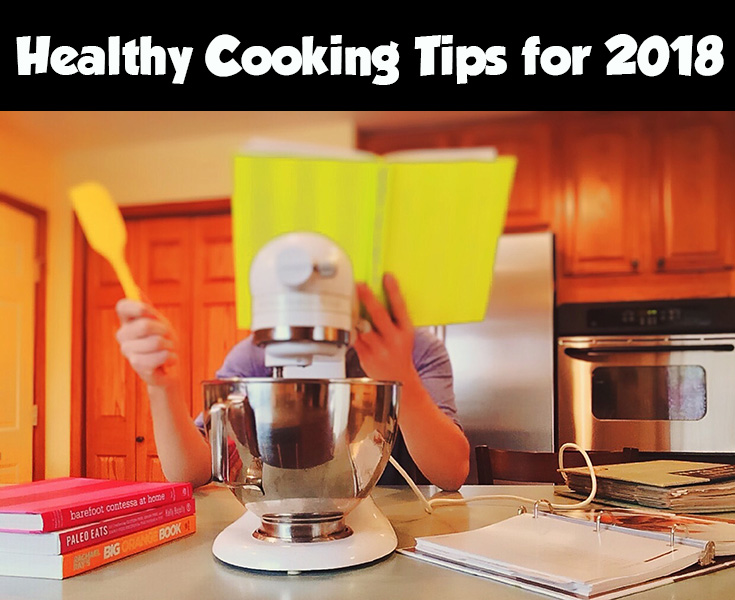Each year, many of us make a commitment to eat better, exercise more and generally to live healthier lives. It’s not only good for us, but it sets a great example for our children. The basis of good health starts with good nutrition. Making just a few changes in the way you shop for and prepare meals can reduce your intake of fat, sodium and processed food.

Evaluate Your Cookware
If you can, trade in aluminum or glass cookware for non-stick enamel pots and pans, silicone bakeware and cast-iron skillets, which becomes naturally non-stick with seasoning over time. This will allow you to retain more flavor in your food while reducing the need to use butter and oil.
Purge Your Pantry
Take an inventory of your cabinets or pantry to get rid of processed foods. You should also remove foods that contain trans-fats or high amounts of sugar and salt. That especially goes for instant soup and gravy mixes, which are loaded with artificial colors, flavors and sodium. Stock up on herbs and spices to season food. If you do buy salt, choose iodized or sea salt and use it sparingly.
Learn How to Read and Interpret Labels
Once you eliminate unhealthy food from your home, you’re going to need to replenish your pantry. You know to avoid processed foods and items that contain unhealthy ingredients, but how is your label-reading game? All packaged foods contain nutrition information regarding calories, vitamins, sodium and fat. But you also have to look at other areas of the package.
Foods that are labeled as “low fat” might have added sugar or salt to improve taste. The same goes for foods that are labeled ‘sugar-free,” but have high amounts of fat instead. Supposedly health food like granola and cereals are notorious for this. Ingredients listed on food labels deserve a reading, too. They’re usually listed by percentage, so if your first ingredient is sugar, it’s probably better to pass it up.
When buying dairy and condiments, try to find reduced fat versions of your favorites. With milk, yoghurt, cheese and mayonnaise, less fat doesn’t mean less taste. If you buy breads, cereals or pasta, try to find multi-grain versions.
Make Smart Substitutions
You don’t have to eliminate fat completely from your diet. We need some fat in our food to help with digestion and other metabolic processes. It also gives us energy. Just be smart in the types of oil you use. Healthy oils include extra-virgin olive oil and organic, cold-pressed coconut oil. If you enjoy a buttery taste, there are butter flavoured substitutes, or you can use real butter in small amounts. It’s preferable to margarine, which is loaded with trans fat; try to find goat butter or butter made from grass-fed dairy cows.
Did you know that you can replace oil in baked goods with applesauce? It’s a cup for cup substitution in cakes and quick breads that keeps them super-moist without affecting taste. You can replace sugar with a natural sweetener like Stevia or honey in small amounts.
Mind Your Methods
You can buy the freshest, healthiest food at the supermarket and ruin all of its nutritional value by drowning it in oil and salt. As mentioned before, your choice of cookware allows you to use less fat to cook. Even if you have a taste for fried foods, you can over-fry them and reduce your oil use to almost nothing. Fat intake can be further eliminated by buying poultry with the skin removed and leaner cuts of meat. Throw them on the grill, bake them or braise them to retain flavor without the grease.
Retain the nutrients in vegetables by steaming or baking them instead of boiling. If you want to eat ‘fast food,” you can microwave them instead. Salt can be replaced with fresh herbs and seasonings, and you’ll never even miss it. Try to limit the amount of sauces that have a high sodium content, like soy or fish sauce. Substitute lemon juice or vinegar. Apple cider vinegar and balsamic are great choices.
Make Every Meal an Occasion
Your state of mind has a lot to do with the state of your health. Food should be prepared with joy and more than a dash of love. Don’t deprive yourself, either. That can only lead to binges. Eat what you love, just do it in a way that’s healthy and in moderation. Take the time to cook and eat as a family, even if you can only fit it into your schedule one or two nights a week. Dress up the table, and add some fresh flowers, candles and music for atmosphere. Finally take a healthy cooking class with Cozymeal, and enjoy your time with strangers while learning to cook.
You don’t necessarily have to stop eating foods you enjoy in order to eat healthy. Just a few tweaks or substitutions can make a world of difference.





Leave a Reply